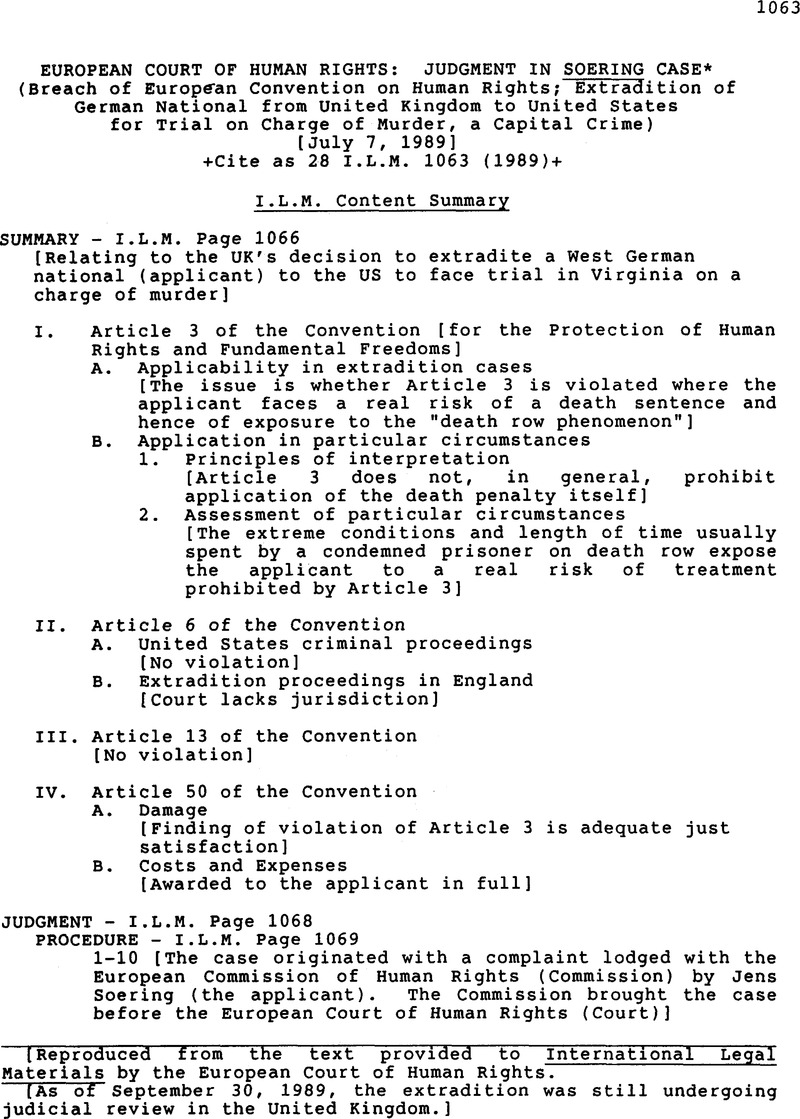Article contents
European Court of Human Rights: Judgment in Soering Case(Breach of European Convention on Human Rights; Extradition of German National From United Kingdom to United States for Trial on Charge of Murder, a Capital Crime)
Published online by Cambridge University Press: 18 May 2017
Abstract

- Type
- Judicial and Similar Proceedings
- Information
- Copyright
- Copyright © American Society of International Law 1989
Footnotes
[Reproduced from the text provided to International Legal Materials by the European Court of Human Rights.
[As of September 30, 1989, the extradition was still undergoing judicial review in the United Kingdom.]
References
1 This summary by the registry does not bind the Court.
* Note by the Registrar. The case is numbered 1/1989/161/217. The first number is the case's position on the list of cases referred to the Court in the relevant year (second number). The last two numbers indicate the case's position on the list of cases referred to the Court since its creation and on the list of the corresponding originating applications to the Commission.
* Note by the Registra. For practical reasons this annex will appear only with the printed version of the judgment(volume 161 of Series A of the Publications of the Court), but a copy of the Commission's report is obtainable from the registry.
(1) § 99 of the judgment.
(2) § 40 of the judgment.
(3) § 27 of the judgment.
(4) See also Article 6 §§ 2 and 6 of the International Covenant on Civil and Political Rights and Article A,§§ 2 and 3 of the American Convention on Human Rights. The very wording of each of these provisions, adopted respectively in 1966 and in 1969, clearly reflects the evolution of legal conscience and practice towards the universal abolition of the death penalty.
(1) § 102 of the judgment.
(2) See, mutatis mutandis, the judgment of 27 February 1987 by the French Conseil d'Etat in the Fidan case, Recueil Dalloz Sirey, 1987, pp. 305-310.
(3) See the French Fidan judgment referred to above.
(4) § 97 of the judgment.
(5) § 20 of the judgment.
(6) § 60 of the judgment.
(7) This opinion deals only with what I consider to be the essential points. I would just like to add briefly that (a) I cannot agree with the first sub-paragraph of§86, or with § 89, since these parts of the Court's reasoning leave too much room for unacceptable infringements of the fundamental rights of persons whose extradition is sought, and (b) with due respect for the Court's case-law, I wish to maintain my earlier reservations concerning the matters at issue in § 115, the first sub-paragraph of § 117 and § 127 (see the W v. the United Kingdom judgment of 8 July 1987, Series A no.121, p.42, the Boyle and Rice judgment of 27 April 1988, Series A no. 131, p.25, and the W v. the United Kingdom judgment of 9 June 1988 (Article 50), Series A no. 136, p.26).
- 1
- Cited by


